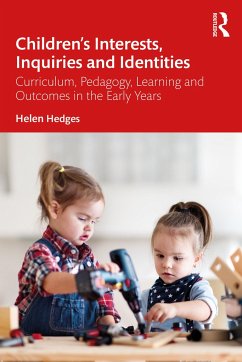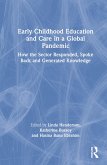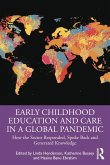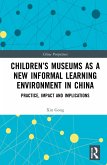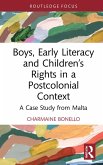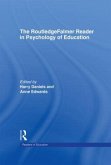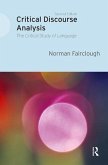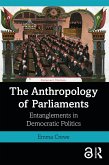Children's curiosity about their lives and worlds motivates many interests. Yet, adults often have fixed ideas about what children's interests are and have been criticised for trivialising children's interests. This book offers a critical and accessible engagement with research on children's interests that challenges us to move beyond surface-level understandings.
Children's Interests, Inquiries and Identities argues that the powerful relationship between interests and informal learning has been under-recognised and undervalued. The book proposes new principles for understanding children's learning. It provides evidence that we need to look beyond the activities or topics children may currently be selecting to find out who and what has stimulated their interests, how we might identify and interpret interests more analytically and deeply, and how we might respond and engage with these in ways that take children's interests seriously. Moving beyond play-based activities, Helen Hedges explains and illustrates a number of ways by which children's interests can be interpreted and understood, to get to the heart of what really matters to, and for, children. The book draws on examples from research with children aged under 5 years, and young adults aged 18-25. It also includes a chapter on teachers' interests. It presents new and original models for interests-based curriculum and sociocultural curriculum and pedagogy for future examination in research and practice.
This book demonstrates that leaving behind long-standing, taken-for-granted practices that have influenced understandings of curriculum, pedagogy, learning, and outcomes allows a new perspective of children's interests to emerge. It will be of interest to researchers, postgraduate students, and practitioners in the early years, parents, and other professionals who work with young children.
Children's Interests, Inquiries and Identities argues that the powerful relationship between interests and informal learning has been under-recognised and undervalued. The book proposes new principles for understanding children's learning. It provides evidence that we need to look beyond the activities or topics children may currently be selecting to find out who and what has stimulated their interests, how we might identify and interpret interests more analytically and deeply, and how we might respond and engage with these in ways that take children's interests seriously. Moving beyond play-based activities, Helen Hedges explains and illustrates a number of ways by which children's interests can be interpreted and understood, to get to the heart of what really matters to, and for, children. The book draws on examples from research with children aged under 5 years, and young adults aged 18-25. It also includes a chapter on teachers' interests. It presents new and original models for interests-based curriculum and sociocultural curriculum and pedagogy for future examination in research and practice.
This book demonstrates that leaving behind long-standing, taken-for-granted practices that have influenced understandings of curriculum, pedagogy, learning, and outcomes allows a new perspective of children's interests to emerge. It will be of interest to researchers, postgraduate students, and practitioners in the early years, parents, and other professionals who work with young children.
Raising critical questions about children's interests, Helen Hedges invites deeper interpretations of a concept that has suffered from surface level understandings and simplistic practices for many years. She has created a thought-provoking book for all those who believe that we owe it to children to make their learning deep, relevant, and meaningful.
Associate Professor Maria Birbili, Aristotle University of Thessaloniki, Greece
This inspiring book presents a compelling case for taking children's interests seriously. Drawing upon a wealth of examples, the book guides readers towards deeper analysis and understanding of children's interests, inquiries, and identity development. Bringing together theory, research, and practice, the author demonstrates how interests can inform models of curriculum and pedagogy that have meaning and relevance for children. This is an essential resource for all involved in the education of young children.
Dr Liz Chesworth, University of Sheffield, England
A systematic theorisation of children's interests has not received the attention it needs. Helen Hedges takes up this challenge and brings together interpretations of what we mean by "children's interests". Vignettes add richness to the book, speaking directly to practice and building professional knowledge. By re-naming, re-claiming, and theorising children's interests, she brings forward new ways of conceptualising foundational practices in early childhood education.
Professor Marilyn Fleer, Monash University, Melbourne, Australia
This original and scholarly book draws on sustained empirical research with a wealth of examples, a coherent theoretical framework that stands as a timely counterpoint to the dominant narratives of child development, and critical analysis of contemporary policy frameworks. The focus on children's interests, inquiries, and identities brings attention to their diverse lives, experiences and capabilities. The strong theory-practice integration makes this book accessible for teachers, professionals who work with children and families, and for parents and kinship members. Students will benefit from the ethical and methodological reflections, as well as the scholarly justifications for engaging with alternative ways of understanding children's possibilities and potential.
Professor Elizabeth Wood, University of Sheffield, England
Associate Professor Maria Birbili, Aristotle University of Thessaloniki, Greece
This inspiring book presents a compelling case for taking children's interests seriously. Drawing upon a wealth of examples, the book guides readers towards deeper analysis and understanding of children's interests, inquiries, and identity development. Bringing together theory, research, and practice, the author demonstrates how interests can inform models of curriculum and pedagogy that have meaning and relevance for children. This is an essential resource for all involved in the education of young children.
Dr Liz Chesworth, University of Sheffield, England
A systematic theorisation of children's interests has not received the attention it needs. Helen Hedges takes up this challenge and brings together interpretations of what we mean by "children's interests". Vignettes add richness to the book, speaking directly to practice and building professional knowledge. By re-naming, re-claiming, and theorising children's interests, she brings forward new ways of conceptualising foundational practices in early childhood education.
Professor Marilyn Fleer, Monash University, Melbourne, Australia
This original and scholarly book draws on sustained empirical research with a wealth of examples, a coherent theoretical framework that stands as a timely counterpoint to the dominant narratives of child development, and critical analysis of contemporary policy frameworks. The focus on children's interests, inquiries, and identities brings attention to their diverse lives, experiences and capabilities. The strong theory-practice integration makes this book accessible for teachers, professionals who work with children and families, and for parents and kinship members. Students will benefit from the ethical and methodological reflections, as well as the scholarly justifications for engaging with alternative ways of understanding children's possibilities and potential.
Professor Elizabeth Wood, University of Sheffield, England

